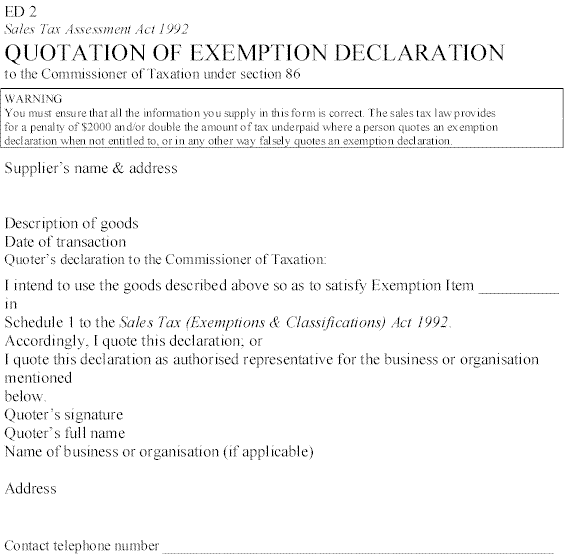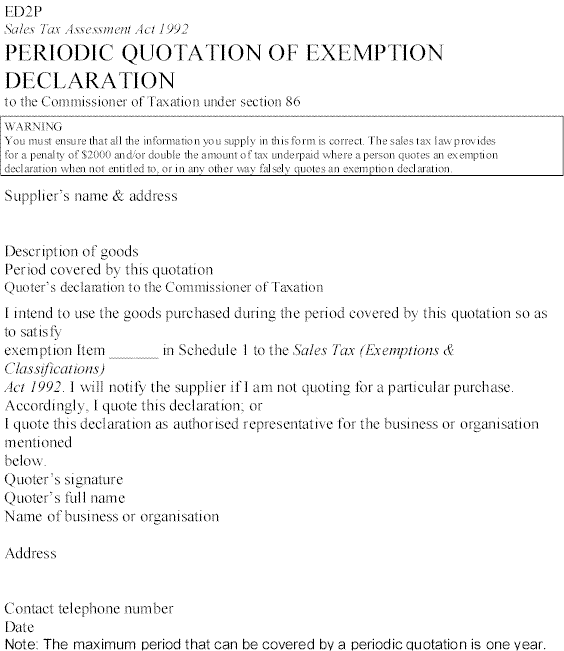Sales Tax Bulletin - No. 17
STB 17
Clothing and Fashion Industry-
This document has been Withdrawn.View the Withdrawal notice for this document.
Date of Issue: 1 May 1997
Valid from 1 May 1997
| Produced by the Withholding & Indirect Taxes Program of the Australian Taxation Office. |
About this bulletin
This bulletin explains how the sales tax law affects people who are in business in the clothing and fashion industry. It is a public ruling for the purposes of section 77 of the Sales Tax Assessment Act 1992 and may be relied upon by any person to whom it applies. It replaces any previous private or public rulings, if they are inconsistent with the bulletin, and is current as at 1 May 1997.
If, after reading this bulletin, you need more information on how the sales tax law affects your business, contact your local Tax Office on 13 28 66 for the cost of a local call.
How does sales tax affect me?
If you are in business as a clothing manufacturer, you're liable for sales tax on any taxable goods you manufacture which you sell or apply to your own use, unless an exemption applies. However, most clothes for human wear are exempt from sales tax. Under the sales tax law, a clothing manufacturer can choose to be registered for sales tax purposes and receive a sales tax registration number.
Although you can choose whether or not to be registered, your choice will affect your entitlement to obtain some goods free of sales tax. If you do register, you will be entitled to obtain free of sales tax, certain goods used in your manufacturing activities by quoting your sales tax registration number to your supplier.
Who can register for sales tax?
You can apply for registration if you are in business and carry out any of the following activities (or intend to do so):
- • manufacture goods;
- • sell goods by wholesale (this generally covers sales to people who resell goods);
- • sell goods (not of your own manufacture) by indirect marketing, e.g., through commission agents;
- • sell raw materials to a manufacturer;
- • sell goods to eligible Australian or foreign travellers in accordance with prescribed export rules; and
- • carry out certain activities on behalf of manufacturers.
How do I register for sales tax?
To register for sales tax purposes, just complete an Application for Registration - Sales Tax form. These forms are available from your local Tax Office. If you don't have a tax file number, you will also need to refer to the Proof of Identity Documents Information Sheet (also available from your local Tax Office) and provide the appropriate form of identification. You'll need to send us this identification with the completed application form. Once we register you, we'll send you a letter with your sales tax registration number on it.
As most clothing for human wear is exempt, you won't have to lodge monthly returns unless you produce, for example, fur garments, jewellery etc. which are subject to sales tax.
How do I quote my sales tax registration number?
Once registered, you can quote your sales tax registration number in the following form to buy certain business inputs free of sales tax:
|
I hereby quote Sales Tax Registration Number Name of person authorised to quote Signature of person authorised to quote Date |
Do I have to quote every time I buy goods free of sales tax?
No. You can now give your suppliers a single quotation of your sales tax registration number to cover all your tax free purchases in a period where that period does not exceed one year (called a periodic quotation), in the following form:
|
I hereby quote Sales Tax Registration Number ____________ in respect of all goods obtained by me during the period ____________ to ____________ inclusive, except goods in respect of which I notify you to the contrary at or before the time of the relevant assessable dealing with those goods. Name of person authorised to quote Signature of person authorised to quote Date Note - The maximum period that can be covered by a periodic quotation is one year. |
What happens if I don't register?
If you choose not to register, you won't be able to buy your business inputs or, in some cases, your trading stock free of sales tax. You may be able to claim a credit for sales tax paid on such goods, but you will have to wait until you have produced goods from those raw materials, or have used those business inputs and have sold the goods or applied them to your own use before you can claim a credit.
For example, an unregistered clothing manufacturer cannot buy overlockers free of sales tax. When those overlockers have been used in the manufacture of garments and the first of those garments is sold, a refund of the sales tax paid on the overlockers becomes available by applying to the Tax Office.
Is there any small business exemption?
The sales tax small business exemption is available to those people who:
- • were liable for $10,000 or less sales tax during the last 12 months; and
- • expect to be liable for $10,000 or less sales tax during the next 12 months.
If you choose to use the small business exemption, you must pay sales tax to your suppliers when buying your business inputs or trading stock. You then do not have to charge sales tax to your customers when you sell goods, nor do you have to pay sales tax when you apply goods to your own use.
If, at any stage, you exceed the $10,000 limit, you will have to calculate and collect sales tax on the current transaction. For more information, contact your local Tax Office on 13 28 66 for a free copy of Bulletin No. 18 Sales Tax - Small Business Exemption.
What goods can I buy free of sales tax?
If you're registered, you can buy certain business inputs free of sales tax by quoting your sales tax registration number. Business inputs includes goods such as:
- • raw materials;
- • machinery, apparatus, tools, etc. used mainly in a manufacturing activity, e.g., sewing machines, overlockers etc; and/or
- • machinery, apparatus, tools etc. used mainly in an activity which directly supports the manufacturing activity, e.g., a computer used mainly to plan a production schedule, order raw materials, cost the manufacturing process etc.
What goods can't I buy free of sales tax?
Not all goods that you buy for your business qualify for sales tax exemption. You can normally only buy business inputs (see above) and in some cases, trading stock free of sales tax.
When you buy goods that don't qualify for sales tax exemption you must not quote your sales tax registration number. Your supplier must then charge you sales tax. You may wish to tell your supplier that you're not claiming exemption on that purchase.
Some examples of goods you can't buy free of sales tax are:
- • general-purpose road vehicles except in certain limited circumstances;
- • mobile phones used mainly for general business or private purposes;
- • staff amenities (such as tea and coffee making equipment, toilet paper etc.); and
- • goods for use mainly in connection with administrative or selling activities (such as general stationery, fax machines, certain computers etc.).
What if I've already given my supplier a periodic quotation?
Where you've given your supplier a periodic quotation, but you're buying goods for which you're not entitled to quote, you must tell your supplier that you are not claiming exemption. The notice should be in the following form:
|
I hereby notify you that I am not quoting for the purchase of the following goods: Description of goods Date of transaction Name of person authorised to make this declaration Signature Date |
If you buy goods free of sales tax and then use them in such a way that they don't qualify for exemption, you will have to pay sales tax to the Tax Office.
What about freelance pattern makers and graders?
Pattern making is manufacture. Grading is the process that results in the making of patterns of various sizes using the original as a template, and is also manufacture. If you're a freelance pattern maker or grader, then you're a manufacturer and may register for sales tax. Once registered, you can buy your business inputs (e.g. cardboard, scissors, rulers etc.) free of sales tax.
If you're not registered, sales tax must be paid on these goods when you buy them and a credit claimed once the patterns are manufactured and sold.
Patterns are not exempt goods and attract sales tax at the current rate. Current tax rates are available from your local Tax Office. However, in most cases, you will sell these patterns to clothing manufacturers who will be entitled to buy them free of sales tax as business inputs. Where your client quotes a sales tax registration number when buying patterns, you can sell them free of sales tax. The written quotations must be kept with your business records for a period of five years.
What about screen printing?
If you are a clothing manufacturer and you also screen-print fabrics and garments as part of your manufacturing process, you can quote your sales tax registration number when you buy your business inputs for use in the screen-printing. If you're not registered, you may claim a credit once the goods are manufactured and sold.
If you are in business and screen-print clothing during the manufacturing process, as a contractor for a manufacturer, you may choose to register for sales tax.
Screen-printing finished clothing is not, in itself, manufacture. Accordingly, if you are not carrying out screen-printing on behalf of a manufacturer, or if you are not screen-printing fabrics and garments as part of your own manufacturing process, you will need to pay sales tax when you buy your screens, dyes, ink etc.
What about independent contractors?
If you are in business as an independent contract maker, you're a manufacturer and may choose to register for sales tax.
Embroidery, pleating, cutting, fusing and pressing are regarded as manufacture-related activities. If you are in business and you engage in embroidering, pleating, cutting, fusing or pressing of fabric or garments as a contractor for a manufacturer, you may choose to register for sales tax.
If you engage in any of the above manufacture-related activities and you choose not to register, you can still buy your business inputs free of sales tax by quoting an exemption declaration to your supplier at the time of purchase. Item 36 in Schedule 1 to the Sales Tax (Exemptions and Classifications) Act 1992 provides exemption for business inputs used mainly in carrying out the contract work.
To claim exemption, you must quote an exemption declaration in either of the approved forms shown on pages 7 and 8.
Are there any other tax obligations I need to know about?
If you are engaged in the clothing manufacturing industry, other than as a salary or wage earner, you have certain obligations under the Reportable Payments System. If you haven't already received information about the Reportable Payments System, ask your local Tax Office for an information brochure, or telephone Freecall 1800 625 624.
Do you need more information?
If you have any questions or need more information about how the sales tax laws apply to you, please contact your local Tax Office:


ATO references:
NO NAT 2156.05.97
